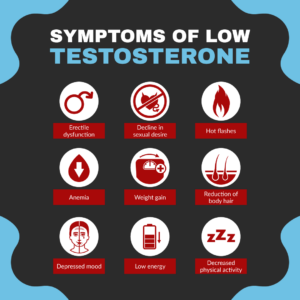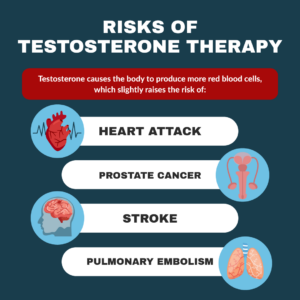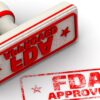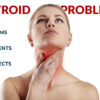Testosterone is a hormone, a chemical in your body that helps tell your organs and tissues what to do and when. Though it’s typically associated with male development, women also produce testosterone in small amounts.
Testosterone is well-known for its role in guiding male puberty, sperm production, and enhancing sex drive.
However, testosterone is also important for:
- Making red blood cells
- Building and maintaining muscle and bone
- Regulating moods
Where Does Testosterone Come From?
In both men and women, testosterone production is controlled in your brain. Your hypothalamus, found deep in the center of your brain releases a hormone called gonadotropin-releasing hormone (GnRH). GnRH then tells your pituitary gland to release a hormone called Luteinizing hormone (LH). LH then tells your testes or ovaries to produce testosterone. In women, much of this testosterone is then converted to estradiol.
It’s unlikely for naturally high testosterone levels to cause noticeable effects in men (though unnaturally high levels achieved through medication or supplementation can cause side effects), but if women have too much testosterone, it may be a sign of a health condition such as polycystic ovary syndrome (PCOS). Your healthcare provider may request more tests.
As the levels of testosterone in your blood increases, your hypothalamus starts making less GnRH, to help keep your testosterone at a healthy level.
Testosterone levels typically rise through puberty then gradually lower as you enter your 30s, though only about 2-6% of men experience symptoms of Low T. Testosterone levels also change throughout the day and are typically highest first thing in the morning.
If your testosterone levels are low, it could signal a problem with your hypothalamus, your pituitary gland, or your testes.
Symptoms of Low T in Men

Low testosterone levels in men can cause many varied symptoms that can be common to many other conditions. If you suspect you have low testosterone levels, it’s important to ask your healthcare provider to check via blood work before considering your treatment options, as some clinics will prescribe the hormone without checking if low testosterone really is the cause of your symptoms.
Symptoms of low testosterone in men include:
- Lower sex drive
- Erectile dysfunction
- Hot flashes
- Anemia
- Unexplained weight gain
- Reduced body hair
- Reduction in muscle mass
- Depressed mood
- Fatigue
How to Test for Low T
If your healthcare provider suspects you may have low testosterone, he or she will order a blood test early in the morning. You may also have other hormone levels checked in case it helps your provider determine the cause of your low testosterone.
Your testosterone levels fluctuate throughout the day, but typically, healthy levels for men are between 300–1,000 ng/dL. For women, 15–70 ng/dL is normal.
Causes of Low T in Men
As you age, it’s normal for your testosterone levels to decrease gradually over time. Conditions like obesity, Type 2 diabetes, chronic kidney disease, chronic obstructive pulmonary disease, or Human Immunodeficiency Virus (HIV) can also lower your production of the hormone. The medical term used to describe low testosterone levels in men is “male hypogonadism.”
Causes of male hypogonadism include:
- Chemotherapy or radiation that damaged the testes
- Certain types of tumors (for example a tumor on the pituitary gland)
- Kallman’s, Klinefelter’s, or Prader-Willi syndromes, all of which are rare genetic conditions
- Head injuries
- Use of anabolic steroids (discussed below)
- Side effects of certain medications
- Inflammation due to infections or autoimmune disorders
Medications That Can Lower Your Testosterone
Some medications may lower your testosterone levels as a side effect. Here are some medications that may lower your testosterone, though, in many cases, the research has shown mixed results.
Drugs and Supplements that Raise Testosterone
There are several ways to raise your testosterone levels, including prescription testosterone replacement therapy (TRT), over-the-counter testosterone-boosting supplements, and illicit drugs, such as anabolic steroids and SARMs.
Prescription Testosterone Replacement Therapy (TRT) or HRT for Men
Your healthcare provider may prescribe TRT if blood tests have shown that you have abnormally low levels of testerone in addition to symptoms of Low T, or if you need gender-affirming care. The benefits and side effects below focus on treatments addressing hypogonadism, or Low T, in cisgender men. To learn more about testosterone in gender affirming care, check out MedShadow’s article, How Do Doctors, Patients, Manage Side Effects of Gender-Affirming Care?
You can get TRT administered in a variety of ways including:
- Injections
- Intranasal gel
- Pellets implanted in the skin
- Gel rubbed on skin
- Skin Patches
Is There a Benefit of TRT?
The evidence is mixed, but one of the most commonly-described benefits of HRT for men is improved sex drive and reduced erectile dysfunction, which many observe within three to six weeks of starting the treatment. It may help increase bone density and muscle mass in some men, though it’s not clear that this results in fewer fractures or greater strength. Changes in energy, muscle, and bone mass can take about six to 12 months to become apparent.
Common Side Effects of HRT for Men

- Acne
- Headaches
- Irritability
- Moodswings
- Aggression
- Depression
- Weight gain
- Swelling
- Painful, prolonged erections
- Enlarged breast tissue
- Increased production of red blood cells, which can raise your risk of blood clots
- Male pattern baldness
Because many of these symptoms can also be common with Low T, experts recommend tracking your symptoms over time with a symptom tracker.
Long-Term Effects of HRT for Men
For years, researchers have suspected that TRT may raise your risk for heart disease and stroke, but the association was unclear. However, in June 2023, researchers published a study of 5,246 men who had been diagnosed with low testosterone through repeated blood tests and were also at high risk of heart disease. Over an average of two years, those that had been prescribed testosterone had no more heart attacks, strokes, or deaths from heart disease than those who received a placebo. However, the same study showed that the men taking testosterone did have more atrial fibrillations (a type of irregular heartbeat), kidney injuries, and pulmonary embolisms (blood clots in the lungs) than their counterparts who took placebos.
The scientists caution that the findings only apply to those with hypogonadism confirmed by several blood tests, not otherwise healthy men who get prescribed the hormone to increase vitality.
“The important caveat is that this should not be interpreted as saying that testosterone does not cause heart attacks and strokes in men without hypogonadism,” Bradley Anawalt, an endocrinologist at University of Washington Medical School who was not involved in the study, told the New York Times. “It is not a signal that testosterone is safe to take in high amounts, for normal men.”
Another study also showed an elevated risk of blood clots. This is likely a result of the increased reduction of red blood cells, and emphasizes the need to conduct regular blood tests during treatment to identify any blood changes early.
Anabolic Steroids (Without a Prescription)
Anabolic steroids are synthetic, or man-made, testosterone. Prescribed TRT uses anabolic steroids to treat conditions that cause Low T, but when you hear people refer to “anabolic steroids,” as those that were not prescribed by a legitimate healthcare provider.
These drugs are riskier than testosterone that is prescribed for you for three main reasons:
- You may end up taking doses far too high for you.
- Your doctor won’t be monitoring your blood tests for signs that you’re at risk of dangerous side effects or excessively high testosterone levels.
- They may be unregulated and thus mislabeled or contaminated with heavy metals such as lead.
Side Effects of Anabolic Steroids, particularly in higher than the normally prescribed doses, include:
- Aggressive behavior
- Accelerated puberty (in teens)
- Shrinking of testicles
- Breast development
- Heightened risk of blood clots and stroke
Long-Term Use of Anabolic Steroids
Over time, using high doses of anabolic steroids can cause shortened stature in teens still growing, tendon rupture (from the sudden muscular growth), liver cancer and hepatitis, infertility, and cardiovascular problems, including higher LDL (bad) cholesterol, lower HDL (good) cholesterol, high blood pressure, and even heart attack.
Selective Androgen Receptor Modulators (SARMs)
Selective androgen receptor modulators, or SARMs, are drugs that mimic testosterone and anabolic steroids. Testosterone works by binding to androgen receptors on cells throughout your body. Androgen receptors are like a lock that can only be opened by a certain type of key—testosterone. However, drugs that look a lot like testosterone—such as SARMs—can sometimes open these same locks.
Researchers are studying SARMs because they hope that instead of binding to androgen receptors in organs all over your body, they may be able to make SARMs that selectively bind to androgen receptors only on your muscles or only on your liver, which could help them treat diseases with fewer side effects.
Some of the diseases SARMs may treat include:
- Alzheimer’s
- Cancer
- Osteoporosis
- Wasting syndrome, (unwanted weight loss of at least 10% of overall body weight)
While they may come up often in social media posts about building muscles, the FDA warns that SARMs are not currently legal in the United States. No SARMs have been FDA approved to treat any condition, nor can they be marketed legally as supplements. As of right now, they are only allowed to be used in research.
Since they can be used in research, they can sometimes be purchased online, but beware. Not only are the risks of SARMs themselves still under investigation, but the supplements you find will not have been analyzed for purity and, like illicit anabolic steroids, are likely to be contaminated with dangerous substances like lead or have very different amounts of the drug than the label claims.
Side Effects of SARMs
According to the FDA, studies with SARMs have demonstrated that they may cause the following side effects:
- Increased risk of heart attack or stroke
- Psychosis/hallucinations
- Sleep disturbances
- Sexual dysfunction
- Liver injury and acute liver failure
- Infertility
- Pregnancy miscarriage
- Testicular shrinkage
Even though they are not legal drugs or supplements, you can report any adverse effects you’ve experienced with SARMs to the FDA here.
Testosterone Boosting Supplements
Rather than testosterone or drugs that mimic testosterone, testosterone-boosting supplements typically contain vitamins, minerals, herbs, and chemicals that are thought to help you produce more testosterone naturally. But, the evidence that these types of supplements actually help raise your testosterone levels is limited, at best.
Researchers reviewed the science behind the 10 most commonly-used ingredients in the five most popular testosterone-boosting supplements they found on Amazon, and discovered that only 30% of studies of the ingredients in humans showed that they actually increased testosterone levels. A separate study showed that less than 25% of supplements that claimed to boost testosterone had data to support the claim. Plus, 10% of the supplements contained ingredients shown to lower testosterone.
Common Testosterone Boosting Supplements
Some of the most common ingredients in testosterone-boosting supplements are:
- DHEA
- D-aspartic acid
- Vitamin D
- Magnesium
- Zinc
- Ashwagandha
Andrew White said he was diagnosed with low testosterone, and started taking supplements. He was wary at first. Working in the fitness industry he says, “I’ve heard stories from gym buddies on both ends of the spectrum – some individuals feeling amazing and noticing immediate improvements, others experiencing unwanted side effects or no results at all.”
He tried several different supplements, but the one he uses now is made up of four different herbs often found in Chinese medicines. At first, he noticed greater energy and improvements in his weightlifting, but he says, over time, he has also experienced side effects such as oily skin and more frequent acne, which he hadn’t had since he was a teenager.
DHEA
DHEA is one of the building blocks of testosterone in your body. It’s a legal supplement in the U.S., but is only available with a prescription in Europe. Additionally, the World Anti-Doping Agency has banned it for athletes in competition. There’s evidence from two small studies that show it may help increase testosterone levels.
D-Aspartic Acid
D-aspartic acid is an amino acid that’s thought to help increase testosterone, but a study of men who took the supplement, while participating in a weightlifting program for 12 weeks, did not see any changes in testosterone levels or improvements in strength or muscle mass compared to a placebo group who also trained.
Vitamin D
In one study, men who were deficient in vitamin D who took vitamin D supplements while undergoing a weight loss program had higher testosterone levels than those who didn’t take the supplements.
Magnesium
If you have a magnesium deficiency, magnesium supplements can boost your testosterone levels. Magnesium is lost through sweat, so some athletes who sweat often may supplement magnesium to replace loss.
Zinc
Having a zinc deficiency can lower your testosterone levels, and if you have deficiency supplementation can help raise them. However, a study showed that the supplement didn’t help people who had normal levels of zinc to start.
Ashwagandha
While ashwagandha is most well-known for its anxiety lowering effects, there is some very preliminary evidence that it may boost testosterone.
Side Effects of Testosterone Boosting Supplements
Several of the supplements described above can cause gastrointestinal distress if taken in high doses, but otherwise, are unlikely to cause severe side effects—assuming that they are pure. Many supplements that claim to boost testosterone will be blends of several ingredients, and, according to the FDA are likely to be contaminated.
In fact, illegal SARMS have been found in many nutritional supplements. The problem led to the FDA issuing warning letters in June and October 2017 to Infantry Labs, LLC, IronMagLabs, Panther Sports Nutrition, Flex Fitness/Big Dan’s Fitness, AndroPharm, and Hardcore Formulations for selling supplements that contained the drug.
Make sure you check the labels of any supplements you buy so you know exactly which ingredients they should contain—there may be many more than the ones listed. Additionally, check for a stamp showing they’ve been evaluated by a third party for purity, to reduce the risk that there’s any contamination.
Natural Ways to Boost Testosterone
Exercise
Exercise of any kind can raise your testosterone temporarily, but consistency can help over time. Working out increases your lean muscle mass and reduces insulin resistance, both of which can help regulate testosterone levels.
Diet
Eating a balanced diet, and making sure you’re getting enough nutrients such as vitamin D, magnesium, and zinc can help keep your testosterone levels healthy.
Foods high in vitamin D include fatty fish and fortified milk.
Foods high in magnesium include: seeds, nuts, beans, and spinach.
Foods high in zinc include: meat, seafood, and fortified cereals.
Weight Loss
Carrying excess weight is associated with low testosterone levels in men. The relationship seems to go both ways: obesity raises the chances of low testosterone and low testosterone raises the chances of obesity. If you’re able to lose weight, it may help bring your testosterone up to a healthy level.
Sleep
Sleep is crucial to your overall health. Missing out on sleep can throw many processes out of whack, and can lead to a less nutritious diet, reduced physical activity, and weight gain, all of which can lower testosterone levels.






